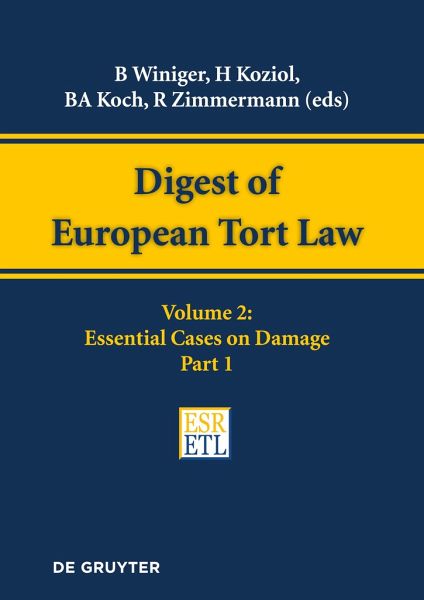
Essential Cases on Damage
Versandkostenfrei!
Versandfertig in 1-2 Wochen
305,99 €
inkl. MwSt.

PAYBACK Punkte
153 °P sammeln!
The increasing Europeanisation of the law of delict/torts has produced textbooks, casebooks, monographs, and also sets of model rules of a genuinely European character. A major gap still existing today relates to the experiences gathered in the national legal systems over the past decades. The present work attempts to fill this gap for one key element of tort law: the notion of damage. It thus does what the previous volume in the 'Digest of European Tort Law' series did for another key element, ie natural causation. Once again, the publication contains a selection of the most important cases d...
The increasing Europeanisation of the law of delict/torts has produced textbooks, casebooks, monographs, and also sets of model rules of a genuinely European character. A major gap still existing today relates to the experiences gathered in the national legal systems over the past decades. The present work attempts to fill this gap for one key element of tort law: the notion of damage. It thus does what the previous volume in the 'Digest of European Tort Law' series did for another key element, ie natural causation. Once again, the publication contains a selection of the most important cases decided in
26 states across Europe as well as by the European Court of Justice. For each case the facts and the relevant court decision are presented, and the decision is analysed within the wider context of the development of the respective legal system. In addition, the editors provide comparative analyses of the case law reported in this volume concerning all the specific problems raised under the heading of damage. The publication also looks into how key cases would be resolved under the European model rules drafted in the field of tort law; and it also highlights cases from earlier periods of legal history.
The editors believe that the material gathered here may provide guidance for an organic convergence of the national legal systems in Europe. It constitutes the basis of an acquis commun that is infinitely richer (though also much more complex) than the rather bland and abstract concepts contained in national codifications, European legislation, and the modern model rules.
26 states across Europe as well as by the European Court of Justice. For each case the facts and the relevant court decision are presented, and the decision is analysed within the wider context of the development of the respective legal system. In addition, the editors provide comparative analyses of the case law reported in this volume concerning all the specific problems raised under the heading of damage. The publication also looks into how key cases would be resolved under the European model rules drafted in the field of tort law; and it also highlights cases from earlier periods of legal history.
The editors believe that the material gathered here may provide guidance for an organic convergence of the national legal systems in Europe. It constitutes the basis of an acquis commun that is infinitely richer (though also much more complex) than the rather bland and abstract concepts contained in national codifications, European legislation, and the modern model rules.
Support
Bitte wähle dein Anliegen aus:
Rechnungen
Bestellstatus
Retourenschein
Storno












